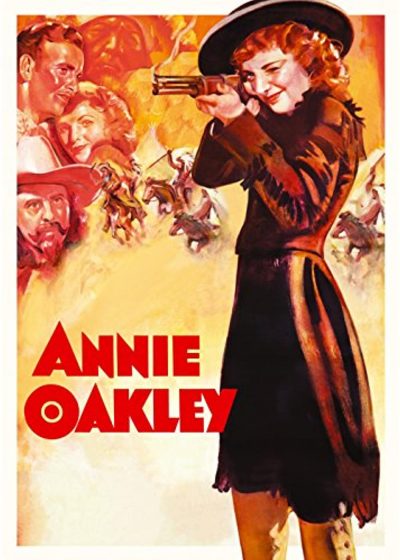★★★
“Annie Gets Her Gun.”
 While not exactly an accurate retelling of the life of noted sure-shot Annie Oakley, this is breezily entertaining. Indeed, you can make a case for this being one of the earliest “girls with guns” films to come out in the talking pictures era. There’s no denying Oakley (Stanwyck) qualifies here. The first time we see her, she’d delivering a load of game birds – all shot through the head to avoid damaging the flesh – to her wholesaler. When barnstorming sharpshooter Toby Walker (Foster) blows into town, Annie ends up in a match with him, which she ends up throwing, due in part to her crush on him. She still gets a job alongside Walker, in the Wild West show run by the renowned ‘Buffalo Bill’ Cody (Olsen) and his partner, Jeff Hogarth (Douglas). But Annie and Toby’s relationship fractures after he accidentally shoots her in the hand, while concealing an injury affecting his sight.
While not exactly an accurate retelling of the life of noted sure-shot Annie Oakley, this is breezily entertaining. Indeed, you can make a case for this being one of the earliest “girls with guns” films to come out in the talking pictures era. There’s no denying Oakley (Stanwyck) qualifies here. The first time we see her, she’d delivering a load of game birds – all shot through the head to avoid damaging the flesh – to her wholesaler. When barnstorming sharpshooter Toby Walker (Foster) blows into town, Annie ends up in a match with him, which she ends up throwing, due in part to her crush on him. She still gets a job alongside Walker, in the Wild West show run by the renowned ‘Buffalo Bill’ Cody (Olsen) and his partner, Jeff Hogarth (Douglas). But Annie and Toby’s relationship fractures after he accidentally shoots her in the hand, while concealing an injury affecting his sight.
This hits the ground running, and roughly the first third plays decades ahead of its time. Don’t forget, this was made only fifteen years after women were granted the right to vote across the entire United States. Its depiction of a strong, perfectly independent woman as personified by Stanwyck is great – there’s also Walker’s former “friend,” Vera Delmar (Perl Kelton). When sternly warned the saloon she’s about to enter is no place for a lady, she breezily replies, “Oh, I’m no lady.” I’m quite impressed this was able to get through, given the rigid imposition of the strict Hays Code, beginning the previous year, with its goal “that vulgarity and suggestiveness may be eliminated.”
Almost inevitably, it can’t maintain this pace. There’s too much footage of the Wild West Show, which seems to consist largely of people on horses milling around the arena. I guess people were easily satisfied in those days. Meanwhile, the romance between Oakley and Walker (an entirely artificial construction, with Walker never existing as an actual person), fails to be convincing. Somewhat more interesting is the portrayal of Chief Sitting Bull, the Native American warrior who also became part of Wild Bill’s show. While depicted largely for comic relief – witness the scene where he turns out the gas lights in his bedroom by shooting at them – he is played by a genuine Indian, Chief Thunder Bird, which is considerably more progressive than some movies. He is also instrumental in Annie and Toby’s reconciliation.
Stanwyck does an excellent job of depicting the heroine, portraying her as someone absolutely confident in her own talents. I’d like to have seen more development of her character: as is, the one we see delivering quail at the start of the film, is almost identical to the one we see making up with Toby in its final shot. Sadly, the subject didn’t live to see her life immortalized in film, having died nine years before this was released. I think she’d probably have been quite pleased with her depiction.
Dir: George Stevens
Star: Barbara Stanwyck, Preston Foster, Melvyn Douglas, Moroni Olsen














